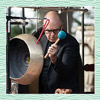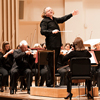The national classical music radio program YourClassical's Performance Today has announced that it has selected composer Jessie Montgomery as its Classical Woman of the Year for 2025. The award recognizes a woman who has made a significant contribution to the industry and who is an inspiration to listeners.
A composer, violinist, and educator, Montgomery has won a GRAMMY Award for her work — which often centers on themes of social justice, the Black diasporic experience, and its foundation in American music. For the last three years, she has served as the Chicago Symphony's Mead Composer-in-Residence.
Some sites may require subscription

The Violin Channel - Tuesday, April 15, 2025

Little Village - Thursday, March 13, 2025
Movement, in all of its forms, is powerful. The fusion of the physical, political and spiritual forms came together during the Iowa City stop of the Alvin Ailey American Dance Theater’s 2025 national tour. Hancher Auditorium has shared its stage with the 67-year-old modern dance company since 1973, bringing a much-needed dose of global-inspired art and fanciful wonder to the region.
Tuesday night’s performance was nothing less than a landscape of music, sight and color. The world-renowned dance troupe supplied a mix of Ailey classics and newer modern works, sending its audience on a ride from the sensational to the spiritual.

Little Village - Monday, February 10, 2025
The fingers move across the keyboard like cavalry. Presto agitato. One after the other, left to right, then again left to right of the keyboard. The tempo is moto perpetuo. The fingertips press each key for an instant — not too much pressure but the impact is relentless. The muscles of the hand follow a pattern; they submit to a memory that’s been imprinted on the cerebellum after years of deliberate practice.
Seated at the piano, the man is looking but not looking, his mind in a liminal space faraway but also here on stage. He’s in a state of flow. The hands, the tendons, the dexterity are those of a young man.

The Gazette - Thursday, January 23, 2025
Daisy Jacobson is working out in preparation of her forthcoming Twyla Tharp Dance tour, which celebrates the 60th anniversary of Tharp’s iconic company. The show, which features “Diabelli” and “Slacktide,” is slated for Wednesday, Jan. 29, 2025, at the Hancher Auditorium in Iowa City.
“Performing such a double bill is super physical,” Jacobson said while calling from New York City’s Ailey Studios. “It’s going to be a very bright show, a very funny show, a very technically demanding show and a very Twyla show.”

The Daily Iowan - Tuesday, December 10, 2024
No one deserves to be forgotten. That is the message “Dear Evan Hansen” presents to its audience through the stories of the titular Evan and the people he interacts with.
Even on a stage flooded with backdrops of scrolling social media posts and notifications, the individual hopefulness and heartbreak of the characters shine through, evoking a multitude of emotions from the audience.
Like many others, I flocked to Hancher Auditorium on Saturday night to experience the first installment of its 2024-25 Broadway series, and I must say, the standing ovation at the end was well-deserved.

Youtube - Monday, December 9, 2024
Through a collaboration between University of Iowa School of Music and Hancher Auditorium alumnus and world-renowned percussionist Steven Schick returned to campus in Fall 2024 and spent a week in residency with UI students and in the Iowa City community.

The Gazette - Friday, November 29, 2024
Previous generations found touchstones in “A Chorus Line,” then “Rent,” followed by “Spring Awakening” and “Hamilton.”
Gen Y and Z found themselves drawn to “Dear Evan Hansen,” which ran on Broadway from 2016 to 2022 and swept up six Tony Awards, including Best Musical. The 2024-25 national tour of this tour de force is coming to Hancher Auditorium in Iowa City from Dec. 6 to 8.
It’s the story of Evan Hansen, a high school senior with social anxiety and few friends, who would rather be on his computer than speak to anyone face to face or even on the phone. But when a letter he wrote falls into the wrong hands, he gets caught up in a social media frenzy spinning off another family’s tragedy.

The Daily Iowan - Monday, November 18, 2024
As the last note was held, the auditorium became quieter and quieter. All that was left was your heart beating in your chest. You could hear a pin drop. Scissors would struggle to cut the tension. As the conductor lowered his hands, the audience rose to their feet in a standing ovation.
On Nov. 17, the St. Louis Symphony Orchestra took the stage at Hancher Auditorium in Iowa City. The event took place on Hadley Stage, a vast concert hall with high, looming ceilings hung with abstract light fixtures.
Under conductor Stéphane Denève, the St. Louis Symphony Orchestra presented an exploration of Wolfgang Amadeus Mozart’s music “from London to Vienna.” From his first symphonic work composed at age eight to his symphony brought about by the death of his mother, the performance covered it all.

The Gazette - Thursday, November 14, 2024
Improvisation isn’t the usual part of classical chamber music training, but stepping into the unusual has been freeing for members of PUBLIQuartet.
The New York-based string quartet is making its first trip to Iowa City for a Hancher performance Nov. 21, along with student workshops.
“We believe everybody can improvise. We’re improvising right now as we speak, and interacting spontaneously,” violinist Jannina Norpoth said during a recent Zoom interview with The Gazette and violist Nick Revel.
“We’ve done improvisation workshops for all ages, all levels. We’ve even done them for non-musicians,” Norpoth added. “It’s really fun to challenge people’s creativity and watch them go to a place that might be uncomfortable for them, and rise to overcome that challenge.”

Little Village - Wednesday, October 30, 2024
Brian Quijada is an Emmy-nominated playwright, actor and composer. He also happens to be a University of Iowa Theatre Arts alumnus, getting his start as an undergrad that ended up double majoring in English and Theatre.
Quijada has returned to Iowa City for a visit culminating in a performance with collaborator Nygel D. Robinson on Hancher Auditorium’s Club Hancher Stage. LV theater columnist Kristy Hartsgrove Mooers talked with Quijada about his roots at UI, his success since undergrad and how telling his specific immigrant story has become a mission statement.

